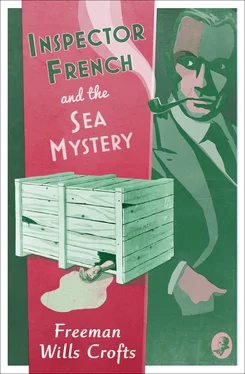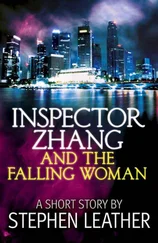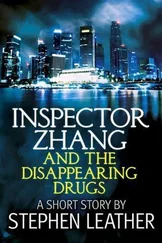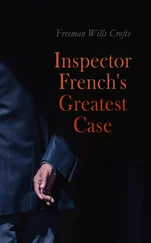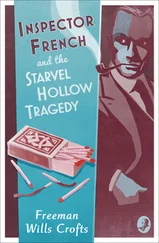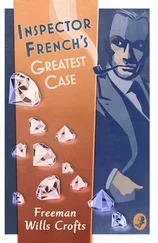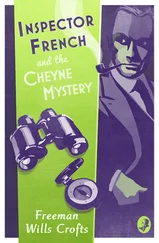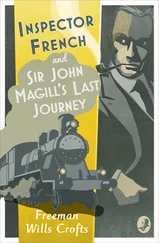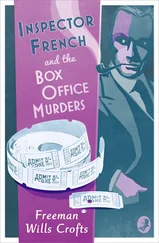Evan demurred, suggesting that he alone should interview the coastguard. But he was what Mr Morgan called ‘biddable,’ and when his father showed that he was in earnest he allowed the subject to drop.
In due course they reached home. Discreet suggestion having resulted in Evan’s settling down with his meccano, Mr Morgan felt himself at liberty. He explained casually that he wanted to drop into the club for an hour, and left the house. In ten minutes he was at the police station.
‘I’ve made a discovery this evening, sergeant, which, I’m afraid, points to something pretty seriously wrong,’ he explained, and he told the officer in charge about the hooking of the crate. ‘I didn’t want my son to see the body—he’s rather young for that sort of thing—so we went home without my saying anything about it. But I’ve come back now to report to you. I suppose you, and not Manners, will deal with it?’
Sergeant Nield bore a good reputation in Burry Port as an efficient and obliging officer, as well as a man of some reading and culture. He listened to Mr Morgan’s recital with close attention and quietly took charge.
‘Manners would deal with it at first, Mr Morgan,’ he answered, ‘but he would hand over to us when he saw what the object was. I think we’ll call for him on the way down, and that will put the thing in order. Can you come down now, sir?’
‘Certainly, that’s what I intended.’
‘Then we’ll get away at once. Just let me get my bicycle lamp.’ He turned to a constable. ‘Williams, you and Smith get another light and take the handcart down to the lifeboat slip. Watson, take charge in my absence. Now, Mr Morgan, if you are ready.’
It was quite dark as the two men turned towards the harbour. Later there would be a quarter moon, but it had not yet risen. The night was calm and fine, but a little sharpness was creeping into the air. Except for the occasional rush of a motor passing on the road and sounds of shunting from the docks, everything was very still.
‘Just where did you say you found the crate, Mr Morgan?’ the sergeant asked.
‘Off Llanelly; off the sea end of the breakwater and on the far side of the channel.’
‘The Gower side? Far from the channel?’
‘The Gower side, yes. But not far from the channel; I should say just on the very edge.’
‘You didn’t mark the place?’
‘Not with a buoy. I hadn’t one, and if I had I should not have thought it worthwhile. But I took bearings. I could find the place within a few feet.’
‘I suppose you’ve no idea as to how the crate might have got there?’
‘Not the slightest. I have been wondering that ever since I learned what was in it. What do you think?’
‘I don’t know, sir, unless it has been dropped off a steamer or been washed into the Inlet from some wreck. We’ll get it to the station and examine it, and maybe we shall find where it came from. If you wait here a second I’ll get hold of Manners.’
They had reached the coastguard’s house, and the sergeant ran up to the door. In a few seconds he returned with a stout, elderly man who gave Mr Morgan a civil good evening.
‘It’s your job, of course, Tom,’ the sergeant was saying, ‘but it’ll be ours so soon that we may as well go down together. Perhaps, sir, you’ll tell Manners about how you found the crate and brought it in?’
By the time Mr Morgan had finished his story for the second time they had reached the boatslip. The sergeant and Manners peeped into the crate in turn.
‘Yes, sir, it’s just what you said,’ the former remarked. ‘It’s a man by the look of him and he’s been dead some time. I think we’ll have the whole affair up to the station before we open any more at it. What do you say, Tom?’
‘Right you are, sergeant, I’ll go with you. I shall ’ave to put in a report about the thing, but I can get my information at the station as well as ’ere. You’ll be coming along, Mr Morgan?’
‘If you please, sir,’ the sergeant interjected, ‘I have to get a statement from you too.’
‘Of course I’ll go,’ Mr Morgan assured them. ‘I’ll see the thing through now.’
The constables having arrived with the handcart, it was wheeled down the slip, and all five men got round the crate and with some difficulty lifted it on.
‘By Jove!’ Mr Morgan exclaimed. ‘That’s some weight. Surely there must be something more than a body in it?’
‘It’s certainly heavy, but it’s a very solid crate. We shall see when we get it to the station.’
With a good deal of pushing and shoving the handcart was got up the slip and the little party moved off along the mole and across the sidings to the town. On reaching the police station the crate was wheeled into a small courtyard in the rear and Nield invited the others into his office.
‘On second thoughts, Mr Morgan,’ he explained, ‘I’ll not unpack the crate until I have reported to the superintendent and get hold of a doctor. Meantime, sir, I’d be glad to get your statement in writing.’
For the third time Mr Morgan told his story. The sergeant took it down, read over what he had written, and got the other to sign it.
‘That will do, sir, for tonight. You will, of course, be required at the inquest tomorrow or next day.’
‘I’ll be there all right.’
‘Then about your son, sir? Has he anything to say that might be of use?’
Mr Morgan looked distressed.
‘Nothing, sergeant, more than I can tell you myself. I hope you won’t have to call the boy. He’s going back to school tomorrow.’
‘That’s all right: he’ll not be wanted. And now, sir, I shouldn’t say more about the affair than you can help. Just keep the discovery of the body quiet and content yourself with the story of finding the crate.’
Mr Morgan promised, and the sergeant wished him goodnight.
His visitor gone, Sergeant Nield handed a carbon of the statement to Manners, promising to let him know how the affair progressed. The coastguard being got rid of in his turn, Nield telephoned the news to Superintendent Griffiths at Llanelly. The superintendent was suitably impressed and in his turn rang up Major Lloyd, the chief constable at Llandilo. Finally the latter gave instructions for Nield to arrange a meeting at the police station for nine o’clock on the following morning. Both the superintendent and the chief constable would motor over, and the local police doctor was to be in attendance. The body would then be removed from the crate and the necessary examination made. Meanwhile nothing was to be touched.
Glad to be relieved from the sole responsibility, the sergeant made his arrangements, and at the hour named a little group entered the courtyard of the police station. In addition to the chief constable and superintendent, the sergeant and two of the latter’s men, there were present two doctors—Dr Crowth, the local police surgeon, and Dr Wilbraham, a friend of Major Lloyd’s, whom the latter had brought with him.
After some preliminary remarks the terrible business of getting the remains from the crate was undertaken. Such work would have been distressing at all times, but in the present case two facts made it almost unbearable. In the first place the man had been dead for a considerable time, estimated by the doctors as from five to six weeks, and in the second his face had been appallingly maltreated. Indeed it might be said to be non-existent, so brutally had it been battered in. All the features were destroyed and only an awful pulp remained.
However, the work had to be done, and presently the body was lying on a table which had been placed for the purpose in an outhouse. It was dressed in underclothes only—shirt, vest, drawers, and socks. The suit, collar, tie, and shoes had been removed. An examination showed that none of the garments bore initials.
Читать дальше
